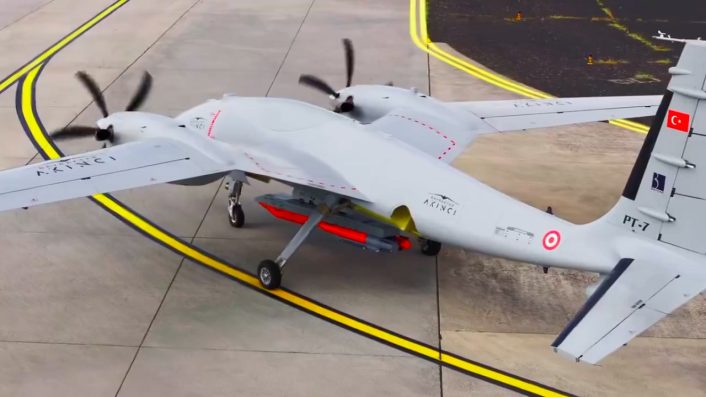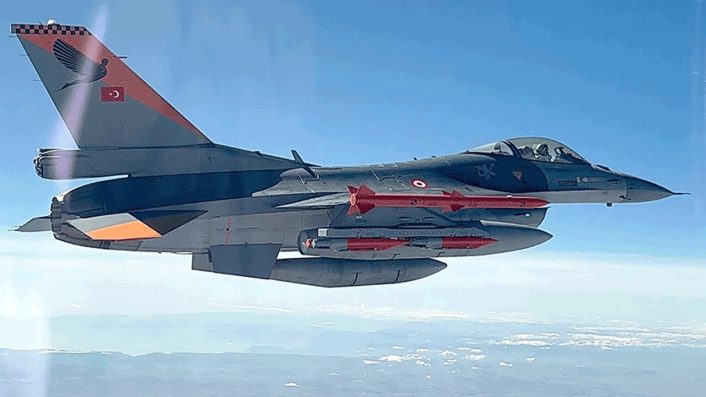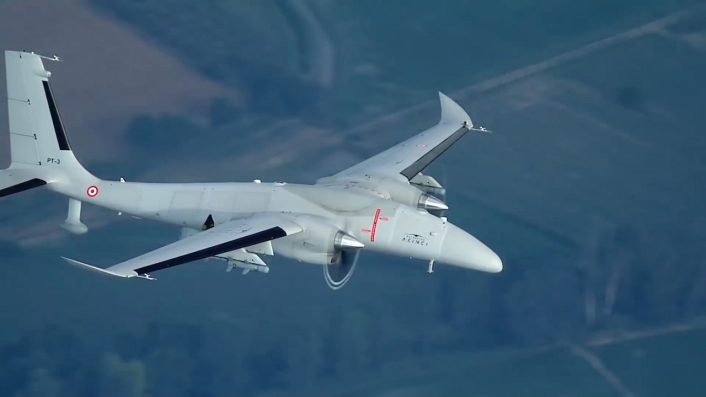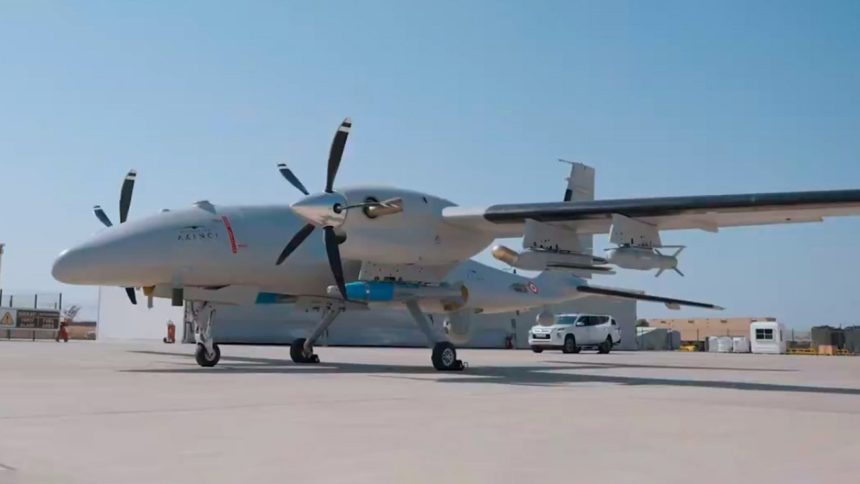The TOLUN Glide Bomb, tested for the first time on the Akinci in 2022, adds to the two weapons already employed also by the Bayraktar TB2, the MAM-T and MAM-L smart munitions, as well as the TEBER guidance kit for Mk-81/82 bombs.
Turkey’s Akinci UCAV (Unmanned Combat Aerial Vehicle) achieved a new milestone by testing a guided gliding munition, TOLUN, the developer Baykar announced on Aug. 9, 2024. Few days later, on Aug. 15, the company also announced the successful testing of the MAM-T and MAM-L Smart Munitions and the TEBER guidance kit.
The drone and aerospace major released videos of the UCAV taking off and releasing the TOLUN on a floating target at sea, while the MAM munitions and TEBER bomb were launched at ground targets. The flights are part of the ongoing test campaign of the new Akinci-C aircraft.
The weapons
The existence of the TOLUN bomb has been reported since late-2022, when Turkish defense news outlets reported “integration activities” of the Tolun and the Akinci. Aselsan developed both the weapon and the SADAK-4T Smart Pneumatic Quad Rack to carry four pieces of the air-to-ground munition.
According to Aselsan, the TOLUN is a GPS/INS guided munition that can be employed against “multiple soft and hardened targets simultaneously.” Its warhead is designed by Tübitak SAGE, with Aselsan developing the rest of the system.
Baykar announced on Dec. 2, 2022, the test of the “Tolun Miniature Bomb” from the Akinci for the first time. On that occasion, Akinci took off from the Akinci Flight Training and Test Center in Çorlu, Tekirdağ, with four bombs carried under the fuselage.
Bayraktar #AKINCI ✈️🐳🚀
MAM-T IIR/TV, MAM-L Akıllı Mühimmatlar ve TEBER Güdüm Kiti Atış Testleri
🎯 Tam İsabet / Bull’s Eye
📍 Tekirdağ / Çorlu #Baykar 🤝 @Roketsan
MAM-T IIR/TV, MAM-L Smart Munitions and TEBER Guidance Kit Firing Tests#MilliTeknolojiHamlesi 🌍🇹🇷 pic.twitter.com/7Q8IhwI1B0
— BAYKAR (@BaykarTech) August 15, 2024
The drone then headed to Konya, at the Karapınar Firing Test and Evaluation Center. During the test, Tolun “hit the target with full accuracy with GPS/INS (Global Positioning System/Inertial Navigation System) guidance.”
The already well-known MAM (Turkish acronym for “smart micro munition”) munitions were developed by Roketsan specifically for the use by UCAVs, as well as light attack and fighter aircraft. Three base variants are available, the laser guided MAM-C and MAM-L and the dual laser/GPS guided MAM-T.
Baykar explicitly mentioned a MAM-T IIR/TV (Imaging InfraRed/TeleVision) variant, so it is possible the weapon has now been equipped also with a new seeker. The MAM-T and MAM-L were tested in conjunction with the TEBER guidance kit, which transforms Mk-81 and Mk-82 bombs into dual laser/GPS guided bombs.
Bayraktar #AKINCI ✈️🐳🚀
TOLUN Mühimmat Atış Testleri
🎯 Tam İsabet / Bull’s Eye
📍 Sinop#Baykar 🤝 @Aselsan 🤝 @SageTubitak
TOLUN Munition Firing Tests#MilliTeknolojiHamlesi 🌍🇹🇷 pic.twitter.com/zG9Sq7Utrc
— BAYKAR (@BaykarTech) August 9, 2024
The testing
The first video released by Aselsan and Baykar showed the Akinci carrying three units of the TOLUN glide bombs on the SADAK rack. The UCAV taxies on the runway and takes off, following which the footage, seemingly from a testing camera installed on the rack, shows the TOLUN being released.
The next clip is a recording from the Akinci’s EO (Electro-Optical) turret capturing the floating sea target being struck. The TOLUN appears to hit the target at a diagonal angle. The drone also has a camera on its tail capturing the rest of its flight as it returns to base.
The second video shows the ground crews preparing Akinci, which has been loaded with two units each of MAM-T, MAM-L and TEBER-82 weapons. All the weapons are inert, as shown by their blue paint.
The footage, recorded both from the tail camera and the EO turret, shows one unit of each weapon being released, before striking the assigned target. While the target range employed has not been specified, it could be assumed to be again Konya.

TOLUN tested also on the F-16
According to Turdef, in previous tests, TOLUN “achieved important milestones such as four simultaneous hits and hitting its target under intense GPS jamming.” These tests were performed by using the F-16 as a launcher platform earlier this year, with four targets hit simultaneously.
The report mentioned that TOLUN would give the F-16 fighters the ability to attack eight targets at once, as it can carry two SADAK racks. “When dropped by fighter jets, TOLUN, guided by GNSS and INS, has a range of more than 110 km,” said Turdef.
The report added that this feature “is important” as some U.S.-supplied munitions with GPS guidance have “experienced trouble hitting their targets protected by Russian GNSS jammers.” This was possibly referring to Russia’s EW (Electronic Warfare) interfering with signals from the American GPS constellation that has been reported since Syria and the ongoing war in Ukraine.
Aselsan is also developing a TOLUN variant with an IIR (Imaging Infrared) seeker to hit moving targets and the unnamed “ground-launched version with Delta-V’s hybrid fuel rocket motor”. The former, according to the company, will use a pod to allow the pilot to be “kept in the loop.”
The latter, going by its framing, could mean the bomb could be fitted for the launch by an MLRS (Multiple Rocket Launch System) like the TRG-230. This is much like the US-made GLSDB (Ground-Launched Small Diameter Bomb), that fires the GBU-39 SDB from the HIMARS (High Mobility Artillery Rocket System).

UCAV role in Turkish doctrine
As The Aviationist had reported in context of a twin-engine supersonic version of the ANKA-3 being announced, Turkey has long envisaged its UCAVs being able to fire AAMs (Air-to-Air Missiles). Akinci, for an instance, has been shown both in artworks and expositions with Bozdoğan and Gökdoğan AAMs, whose class is equivalent to the AIM-9X and AIM-120C, respectively.
IMAGE 4: The Tolun being released from the Akinci.
While this concept presents its own set of techno-tactical challenges, given the kinematic and remote-control limitations of UCAVs, it also appears to be a low-cost, safe and reasonably effective concept for ‘defensive air’ operations. If networked with other assets like Gen. 4, 4.5, Gen. 5 manned fighters and AEW&C aircraft – which Ankara can field – AAM-firing drones could be effective standoff anti-air missile release platforms to keep enemy aircraft at bay.
Given how the Kizilelma is being planned to be integrated with the MURAD AESA radar, Turkish UCAVs can unburden manned fighters from low-risk airspace surveillance missions and enforce a form of air denial over a certain sector. Because of the generally higher endurance of the UCAVs compared to manned fighters, this could mean having assets persistently surveilling the airspace, while manned fighters could be dedicated to higher priority roles.
Thus, the Turkish military is clearly showing signs of evolving its own multi-element networked force like the US, Russia and China. After downing enemy planes with ground and air-launched anti-air missiles, a Tolun-armed Akinci can be used in synchronized actions for attacking light, tactical land targets in a more permissive environment.










